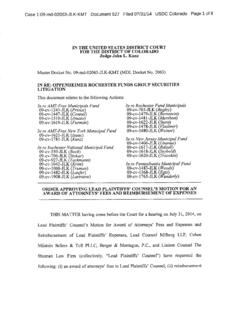Transcription of THE SUPREME COURT OF APPEAL OF SOUTH AFRICA
1 THE SUPREME COURT OF APPEAL OF SOUTH AFRICA Reportable CASE NO: 140/05 In the matter between: THE WESTERN CAPE MINISTER OF EDUCATION First Appellant THE HEAD: EDUCATION, WESTERN CAPE EDUCATION DEPARTMENT Second Appellant PARENTS OF CERTAIN LEARNERS CURRENTLY RECEIVING INSTRUCTION AT MIKRO PRIMARY SCHOOL Third
2 Appellants and THE GOVERNING BODY OF MIKRO PRIMARY SCHOOL First Respondent MIKRO PRIMARY SCHOOL Second Respondent _____ Before: STREICHER, CAMERON, BRAND, LEWIS & MLAMBO JJA Heard: 23 MAY 2005 Delivered: 27 JUNE 2005 Summary.
3 Section 29(2) of the Constitution the right to receive education in an official language at a public educational institution if practicable not a right to receive such education at each and every public educational institution s 6(2) of SOUTH African Schools Act 1996 determination of language policy of established ordinary public school the function of governing body department of education has no power to determine such language policy s 16(3)
4 Of the Act head of provincial education department must exercise authority in regard to the professional management of a public school through the principal - s 41 of the Constitution governing body of a public school does not operate within a sphere of government when determining the language policy of a public school. _____ J U D G M E N T _____ STREICHER JA 2 STREICHER JA: [1] Mikro Primary School ( the second respondent ) is an Afrikaans medium public school in Kuilsriver whose governing body ( the first respondent ) refused to accede to a request by the Western Cape Education Department ( the department ) to change the language policy of the school so as to convert it into a parallel medium school.
5 A subsequent directive by the Head: Education, Western Cape Education Department ( the second appellant ) to the principal of the second respondent to admit certain learners, and to have them taught in English; the dismissal of an APPEAL against the directive to the Western Cape Minister of Education ( the first appellant ); and the resultant admission of 21 learners for instruction in English gave rise to an urgent application by the respondents to the Cape High COURT ( the COURT a quo ) for an order setting aside the directive and the decision on APPEAL , as well as for ancillary relief.
6 The application succeeded and the COURT a quo: a) Set aside the directive of the second appellant; b) Set aside the decision by the first appellant upholding the directive by the second appellant; c) Interdicted the first and second appellants from compelling the second respondent or its principal to admit learners otherwise than in compliance with the second respondent s language policy; 3d) Interdicted the first and second appellants from instructing or permitting officials of the department to unlawfully interfere with the government or the professional management of the second respondent; e) Ordered that the 21 learners who had been admitted to the second respondent be placed by the appellants at another suitable school or schools.
7 The judgment is reported as Governing Body of Mikro Primary School v Western Cape Minister of Education [2005] 2 All SA 37 (C). With the leave of the COURT a quo the first and second appellants now APPEAL to this COURT against the whole of the judgment. [2] The parents of the 21 learners referred to were joined as third respondents in the COURT a quo. Although they had not appealed against the COURT a quo s judgment, they made common cause with the appellants rather than with the respondents in this COURT .
8 However, since the other parties had no objection to their counsel addressing us and attacking the COURT a quo s order, we allowed her to do so. The parents so represented will therefore be referred to as the third appellants. [3] Section 29(2) of the Constitution provides as follows: Everyone has the right to receive education in the official language or languages of their choice in public educational institutions where that education is reasonably practicable. In order to ensure the effective access to, and implementation of, this right, the state must consider all reasonable educational alternatives, including single medium institutions, taking into account 4(a) equity; (b) practicability; and (c) the need to redress the results of past racially discriminatory laws and practices.
9 [4] The SOUTH African Schools Act 84 of 1996 ( the Act ) was passed shortly after the adoption of the Constitution. According to the long title it was passed in order [t]o provide for a uniform system for the organisation, governance and funding of schools; to amend and repeal certain laws relating to schools; and to provide for matters connected therewith . In the preamble to the Act it is stated, inter alia, that the Act is passed because this country requires a new national system for schools which will redress past injustices in educational provision.
10 , advance the democratic transformation of society, combat racism and sexism and all other forms of unfair discrimination and intolerance, .. , protect and advance our diverse cultures and languages, uphold the rights of all learners, parents and educators, and promote their acceptance of responsibility for the organisation, governance and funding of schools in partnership with the State . [5] In terms of s 12 of the Act the Member of the Executive Council of the province which is responsible for education in that province must provide public schools for the education of learners out of funds appropriated for this purpose by the provincial legislature.















